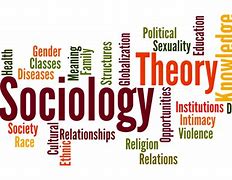
What is Sociology?

What is Sociology
INTRODUCTION
In the family of social sciences, Sociology is comparatively a new entrant. But because of its dealing with social problems, social relationships and social interactions the importance of the study of this subject has considerably increased. It has considerably developed in methodology, scope and approach. Attempts are now being made to study every social problem scientifically and objectively, eliminating subjectivity to the extent possible a distinctive way of examining human interactions. Sociology is the systematic study of social behavior and human groups. It focuses primarily on the influence of social relationships upon people’s attitudes and behavior and on how societies are established and change. As a field of study sociology has a very broad scope. It deals with families, gangs, business firms, computer networks, political parties, schools, religions, and labor unions. It is concerned with love, poverty, conformity, technology, discrimination, illness, alienation, overpopulation and community.
MEANING
The term ‘Sociology’ was coined by Auguste Comte, a French philosopher in 1830 and he is regarded as ‘the father of sociology’. The word ‘sociology’ is derived from Latin term ‘societus’ meaning ‘society’ and a Greek term ‘logos’ meaning ‘study’ or ‘science’. The meaning of sociology is thus the ‘science’ of ‘society’.
DEFINITIONS
Sociology is being defined differently by different sociologists.
Comte – “Sociology is the science of social order and progress.”
Ward -“Sociology is science of society.”
Giddins – “Sociology is scientific study of society.”
Ginsberg – “Sociology is the study of human Inter-actions and inter-relations, their conditions and consequences.”
SUBJECT MATTER
Sociology is the study of social life as a whole. It does not deal with one aspect of society; it studies various aspects of society which are the subject matter of sociology which are:
1) Social organization
2) Social structure
3) Social institutions
4) Social groups
5) Culture
EARLY THINKERS
-
August Comte: In France, the 19th Century was an unsettling time for the nation’s intellectuals. The revolution of 1789 deposed the French monarchy and Napoleon suffered defeat in his effort to conquer Europe.Philosophers and intellectuals were finding the ways out to improve the society. August Comte’s contemporaries consider him the most influential philosopher of the early 1800s. He believed that to improve society, one should develop the theoretical science of society and carry out a systematic investigation of behavior. He coined the term sociology to apply to the science of human behaviors.
-
Emile Durkheim: – Durkheim asserted that we must understand behavior in the larger social context, rather than as individual action.
-
Max Weber: Max Weber was born in Germany (1864-1920). He studied legal and economic history, but gradually developed an interest in sociology. Later he became professor and taught at various German universities. He receives credit for his key conceptual tool: the Ideal type. Researchers can use the concept of ideal type to study the family, religion, authority, and economic systems, as well as to analyze bureaucracy.
-
Karl Marx: Karl Marx (1818-1883) was a critique of existing institutions that a conventional academic career was impossible. He was a revolutionary and spent most of his life in exile from his native Germany.
IMPORTANCE
Before its emergence, scholars studied society in an unscientific manner and no science had made society its central concern. It is through the study of sociology that the truly scientific study of the society has been possible.
The interdisciplinary nature of sociology allows for a comprehensive understanding of the complexities of society. This holistic approach enables sociologists to analyze various social issues from multiple perspectives, leading to more nuanced and informed solutions. By examining the interconnections between individuals, institutions, and societies, sociology provides valuable insights into the root causes of social problems and the potential strategies for addressing them. Education is widely regarded as a powerful tool for personal growth and societal progress. It equips individuals with the knowledge and skills needed to tackle the complexities of the modern world and address issues of inequality and injustice.
Consequently, people see education as essential for fostering a more inclusive and fair society where everyone has the opportunity to thrive.
-
It studies role of the institutions in the development of the individuals.
-
Its study is indispensable for understanding and planning of society.
-
It is of great importance in the solution of social problems.
-
It has drawn our attention to the intrinsic worth and dignity of man.
-
It has made great contribution to enrich human culture.
-
It is of great importance in the solution of international problems.
-
Its value lies in the fact that it keeps us update on modern situations.

